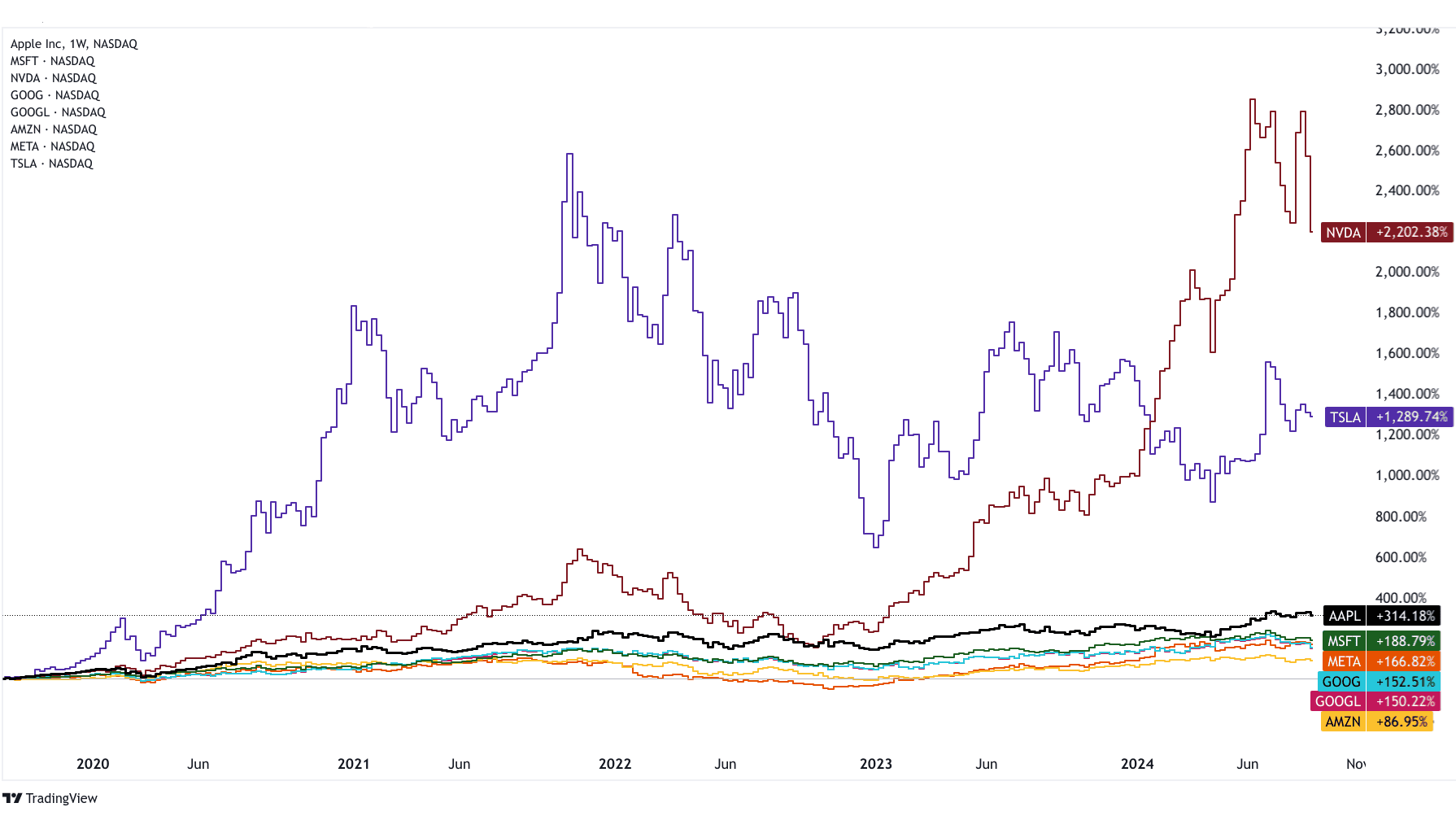- Tech stocks are known for their high return potential, with companies like Nvidia business growth led to a 108% year-to-date stock price return.
- Tech stocks exhibit volatility, as seen in Tesla stock with Beta (5Y monthly) of 2.29 causing massive price swings.
- Finally, tech stocks tend to offer high liquidity, with large-cap stocks like Apple and Microsoft trading millions of shares daily, making them easy to buy and sell on the market.
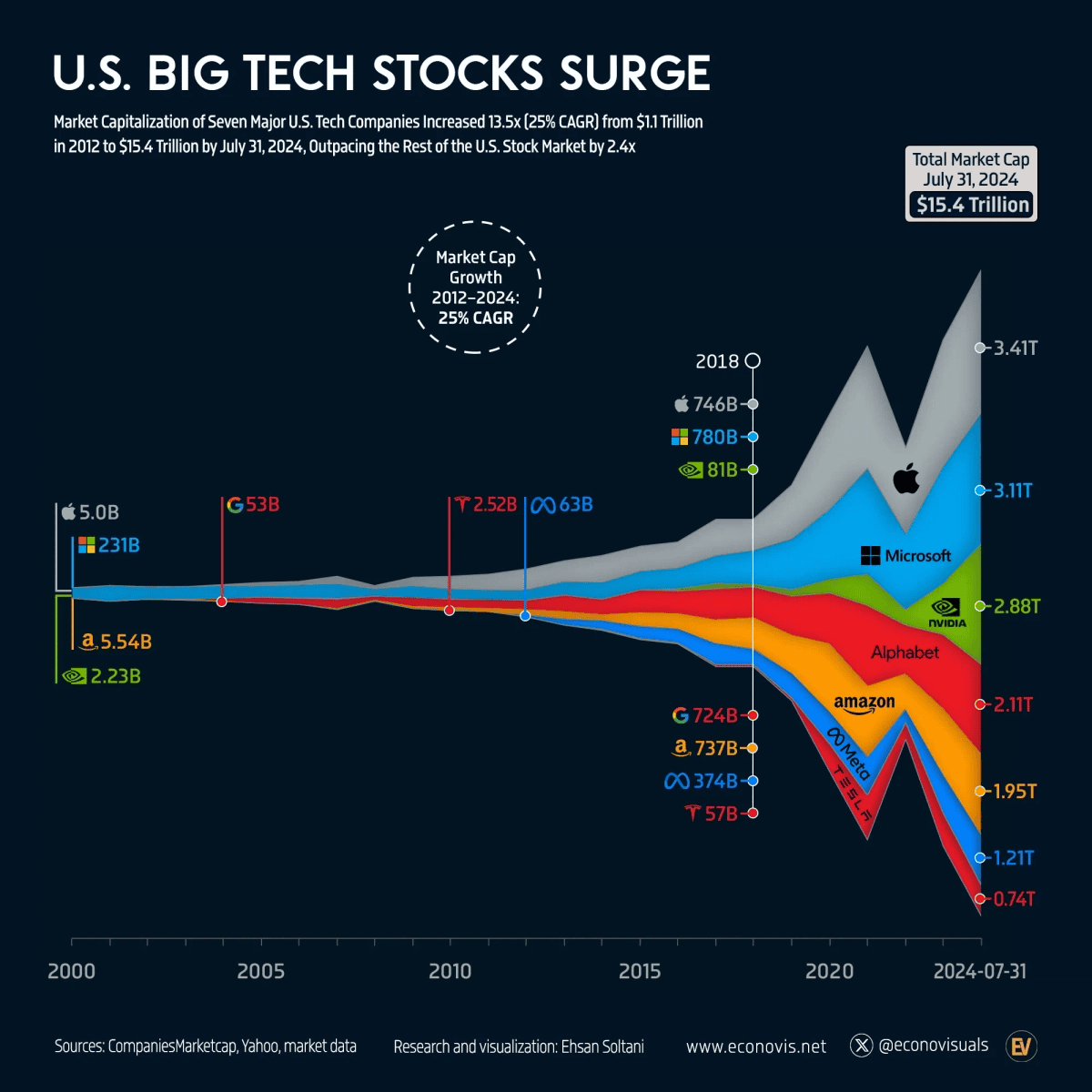
Source: visualcapitalist.com
I. What Are Tech Stocks
Tech stocks refer to publicly traded shares of companies operating in the technology sector. These companies are involved in industries such as software development, hardware manufacturing, telecommunications, semiconductors, and internet services. Leading tech stock companies aka Magnificent 7 include giants like Apple, Microsoft, Nvidia, Amazon, Alphabet (Google), Tesla, and Meta (Facebook). The tech sector is broad and encompasses businesses focusing on artificial intelligence (AI), cloud computing, e-commerce, cybersecurity, and digital entertainment. Top 5 companies in the S&P 500 technology sector account for 29% of the index's market capitalization as of July 2024, making tech stocks a critical component of the global market.
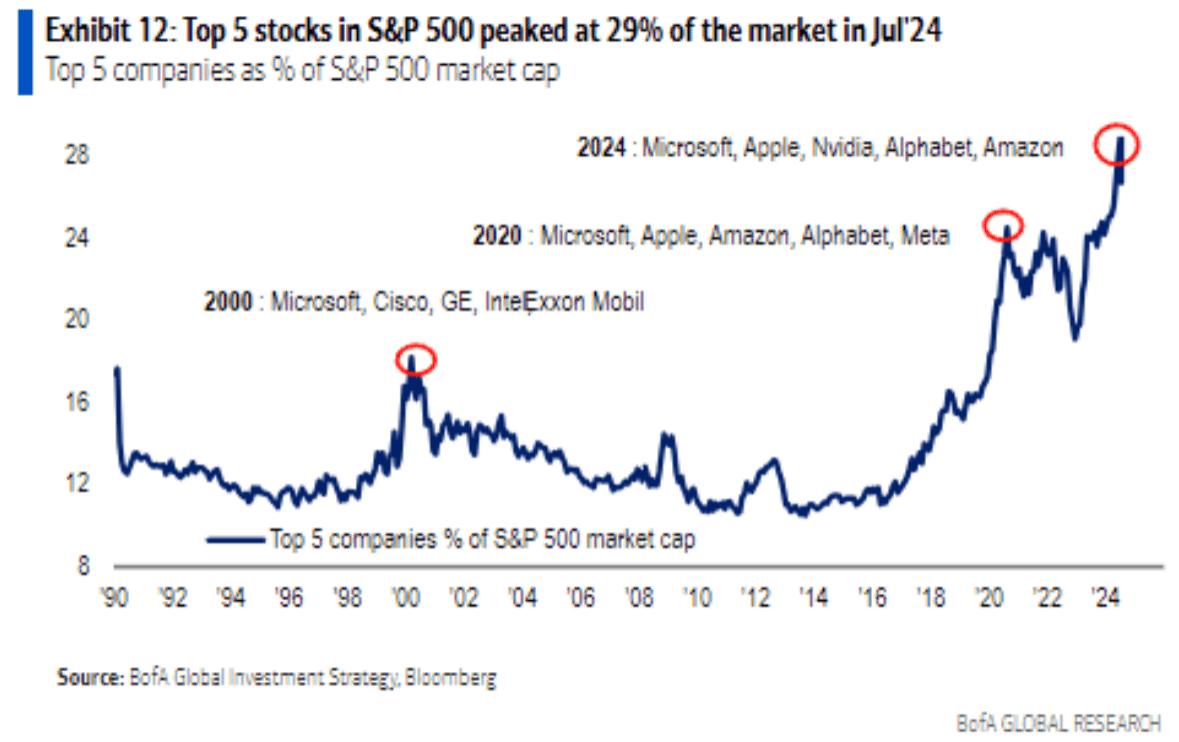
Source: substackcdn.com
Why Invest in Tech Stocks?
- Strong Historical Performance & Resilience: Tech stocks have outperformed the broader market over the past two decades. For instance, the NASDAQ-100, which is dominated by tech companies, gained 135% in the last 5 years, compared to the S&P 500's 82% growth in the same period.
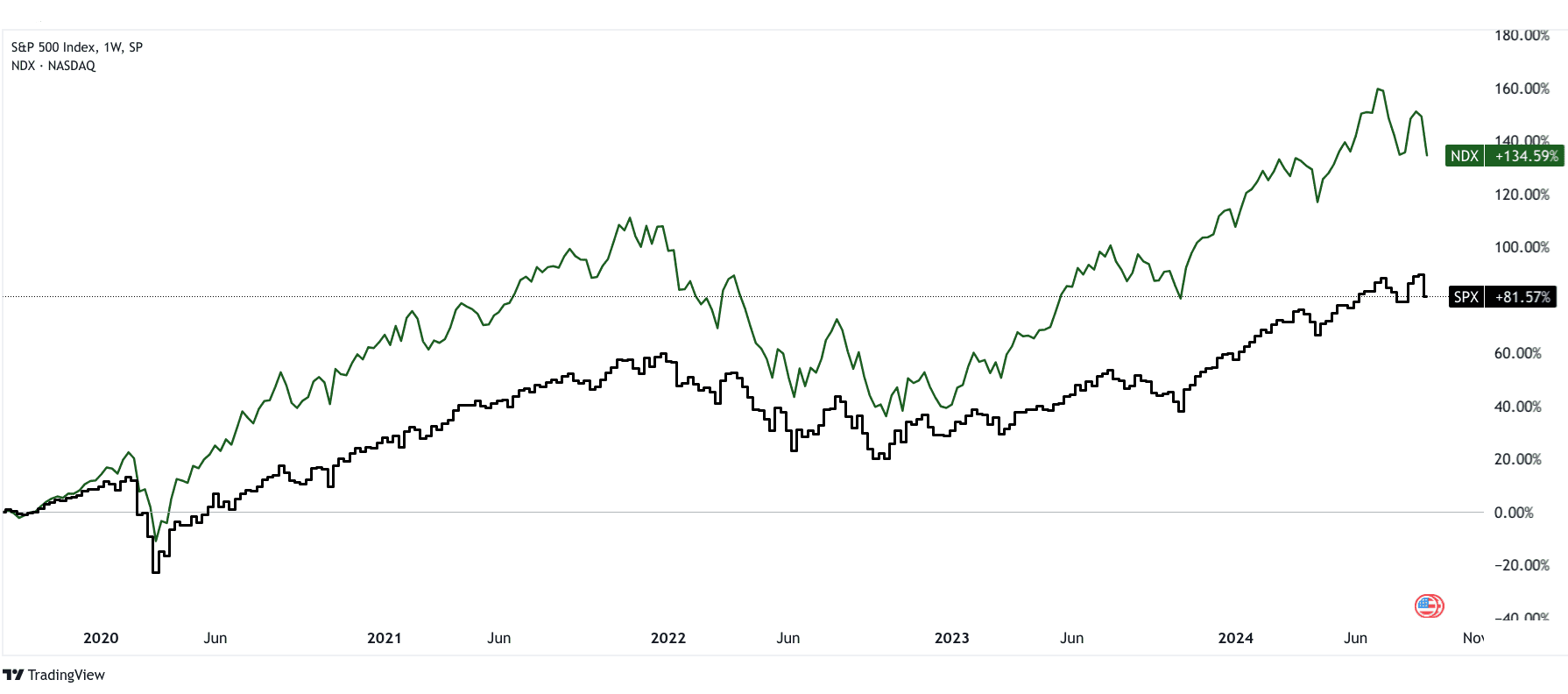
Source: tradingview.com
- Cutting-Edge Technology: Tech companies drive innovation. Areas like AI, blockchain, and cloud computing have revolutionized industries, providing immense growth opportunities. For example, public cloud computing is expected to grow to $805 billion in 2024 and hit 2X by 2028.
- Global Reach: Major tech firms operate globally. In Q3 fiscal 2024, Apple generated over 56% of its net sales from outside the US, indicating tech’s international market appeal.
- High Growth Potential & Attractive Valuations: Tech companies often report high earnings growth. For example, Nvidia's revenue grew by 195% year-over-year on a TTM basis in Q2 fiscal 2025, driven by demand for graphics processing units (GPUs) in AI and Data Centers.
- Young Consumer Base & Growing Middle Class: A younger demographic and expanding middle class, especially in developing regions, increase the adoption of new technologies, further fueling growth in the tech sector.
II. Best Tech Stocks
Magnificent Seven Stocks
The term "Magnificent Seven" was popularized in 2023 to refer to seven tech giants whose stock performance dominated the market. These companies are Apple (AAPL), Microsoft (MSFT), Nvidia (NVDA), Alphabet (GOOG/GOOGL), Amazon (AMZN), Meta (META), and Tesla (TSLA). Together, they represent significant market influence, comprising over 50% of the Nasdaq-100's market capitalization. These stocks are regarded as leaders in innovation, market share, and financial performance, driving much of the tech industry's growth. Their combined market value exceeds $11 trillion as of mid-2023.
Apple (AAPL)
Apple is the largest publicly traded company by market capitalization, valued at over $3 trillion in 2023. Known for its iPhone, Mac, iPad, and growing services segment (iCloud, Apple Music), it has a dominant presence in consumer electronics and software services.
Apple has seen robust growth in services, with services revenue reaching $24.2 billion in Q3 fiscal 2024, contributing to a record gross margin of 46.3%. Despite slowing iPhone sales, its ecosystem's stickiness ensures steady performance. The stock price remained stable and delivered a YTD price return of 19% in 2024 (September 8).
Future Growth: Apple’s focus on AI, augmented reality (AR), and virtual reality (VR) technologies, including its Vision Pro headset, positions the company for future growth. Expansion in the services and wearables segments is also expected to drive long-term growth.
Microsoft (MSFT)
Microsoft is a leader in software (Windows, Office) and cloud services (Azure). It holds a market cap exceeding $2.5 trillion as of 2023, with Azure commanding 21% of the cloud market, second only to Amazon Web Services (AWS).
Microsoft has leaned into artificial intelligence (AI) by integrating OpenAI's ChatGPT into its products, enhancing productivity tools like Word and Excel. The stock surged in 2023, peaking at $366 in July.
Future Growth: AI integration and cloud dominance are expected to continue driving revenue. Microsoft's investment in AI startups and cloud computing, along with LinkedIn’s growth, supports future growth potential.
Nvidia (NVDA)
Nvidia is the dominant player in the graphics processing unit (GPU) market, with over 80% market share. Its GPUs are critical for AI, data centers, and gaming.
Nvidia's revenue surged 126% YoY in fiscal 2024, driven by AI and data center demand. In 2024, the stock delivered 114% YTD price return, reaching a high of $140 in June. Nvidia’s focus on AI computing has solidified its place as a leader in the next technological wave.
Future Growth: The demand for AI and machine learning (ML) hardware is expected to continue boosting Nvidia’s growth. Its dominant position in GPUs and partnerships with cloud providers like Microsoft and AWS solidify long-term growth.
Alphabet (GOOG/GOOGL)
Alphabet, Google's parent company, dominates the global search engine market with a share exceeding 90%. It’s also a leader in digital advertising and cloud services (Google Cloud).
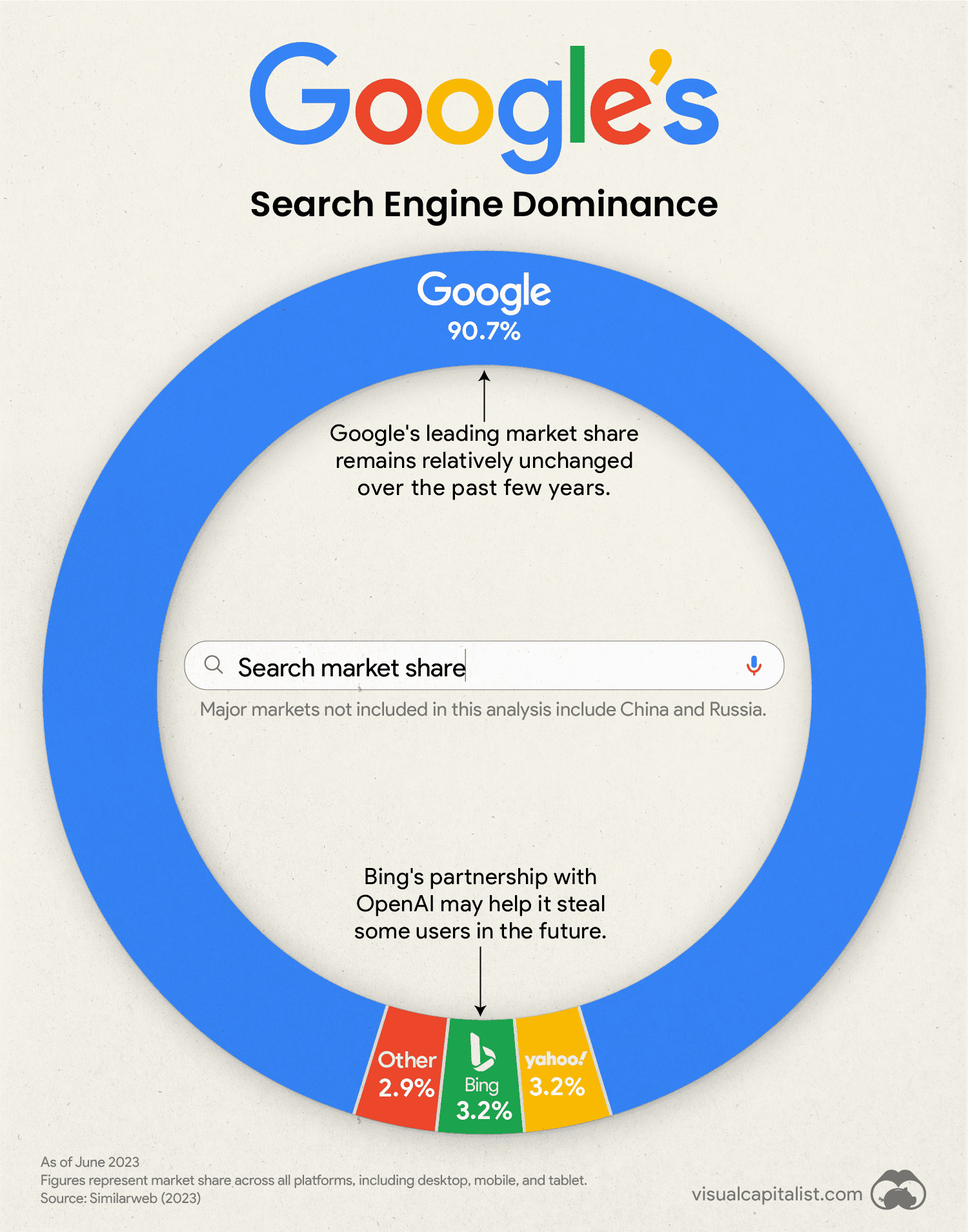
Source: visualcapitalist.com
Alphabet has made strides in AI with its Bard chatbot and generative AI initiatives across Google Search and Google Cloud. The stock saw a steady increase, delivering a 5Y price return of 159% in September 2024.
Future Growth: Alphabet's cloud and AI investments, combined with its advertising revenue stream, are expected to remain strong growth drivers. Expansion into AI and new hardware markets, such as Pixel phones and AI-powered services, offers further upside.
Amazon (AMZN)
Amazon leads in e-commerce and cloud computing, with AWS holding a 32% market share as of Q2 2024. Its market cap exceeds $1.8 trillion.
Despite slower e-commerce growth, AWS revenue continues to rise. In Q2 2024, AWS generated $26 billion, representing 19% growth year-over-year. The stock gained 14% (YTD) in 2024, peaking at $201 in July.
Future Growth: Amazon's focus on AI-powered cloud services and innovations in logistics, including drone deliveries, positions it for continued dominance. AWS remains a key growth driver as cloud adoption increases.
Meta (META)
Meta, the parent of Facebook, Instagram, and WhatsApp, dominates social media with a global user base exceeding 3.2 billion. It’s investing heavily in the metaverse and virtual reality through its Oculus division.
Meta’s stock rebounded 150% in 2023, driven by cost-cutting measures and strong performance in its advertising business, which reached 24.28% TTM revenue growth in Q2 2024.
Future Growth: Meta’s future growth hinges on its metaverse and VR investments. If successful, these ventures could open new revenue streams, although they are still in their early stages.
Tesla (TSLA)
Tesla is the leading electric vehicle (EV) manufacturer, with a 65% share of the U.S. EV market in 2023. Its current market cap is around $673 billion.
Tesla's stock has been volatile, but it surged over 1290% in 5 years (in September 2024), reaching $211. Tesla’s Cybertruck launch and continued expansion into energy solutions like solar panels and battery storage are notable developments.
Future Growth: Tesla’s plans to increase EV production and expand into autonomous driving are key growth drivers. Its dominance in EVs and innovations in battery technology support long-term expansion.
Source:tradingview.com
Magnificent 7 Stocks ETF
To capitalize on the influence of these tech giants, financial firms have created ETFs tracking the performance of these stocks. ETFs such as the Invesco QQQ Trust (which includes all seven stocks) allow investors to access their growth in a diversified manner, mitigating risks associated with individual stock volatility. Also, Roundhill Magnificent Seven ETF (MAGS) holds equal weight exposure to Mag 7 stocks and solely tracks them.
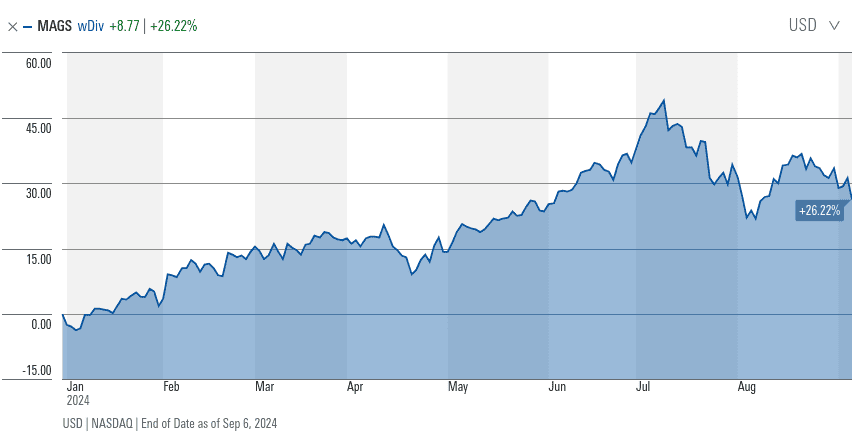
Source: morningstar.com
Other Top Tech Stocks to Buy: AI Tech Stocks
- Advanced Micro Devices (AMD): A leader in semiconductor design, focusing on CPUs and GPUs, AMD has benefited from increased demand in data centers and gaming. It has a 30% market share in CPUs and competes with Nvidia in GPUs.
- CrowdStrike (CRWD): A leading cybersecurity firm, CrowdStrike specializes in endpoint protection and cloud security. Its revenue grew 42% in 2023, reaching $2.7 billion.
- Broadcom (AVGO): A semiconductor and infrastructure software provider, Broadcom holds a dominant position in networking chips and broadband technologies. Its stock gained 55% in 2023, driven by AI-related demand.
- MicroStrategy (MSTR): Known for its large Bitcoin holdings, MicroStrategy is also a business intelligence software company.
- Super Micro Computer (SMCI): Focused on server hardware, SMCI is benefiting from the rise of cloud computing.
- Qualcomm (QCOM): A leader in mobile chipsets, Qualcomm holds a strong position in 5G technology and licensing.
- Salesforce (CRM): A global leader in customer relationship management (CRM) software, Salesforce has expanded into AI through its Einstein platform.
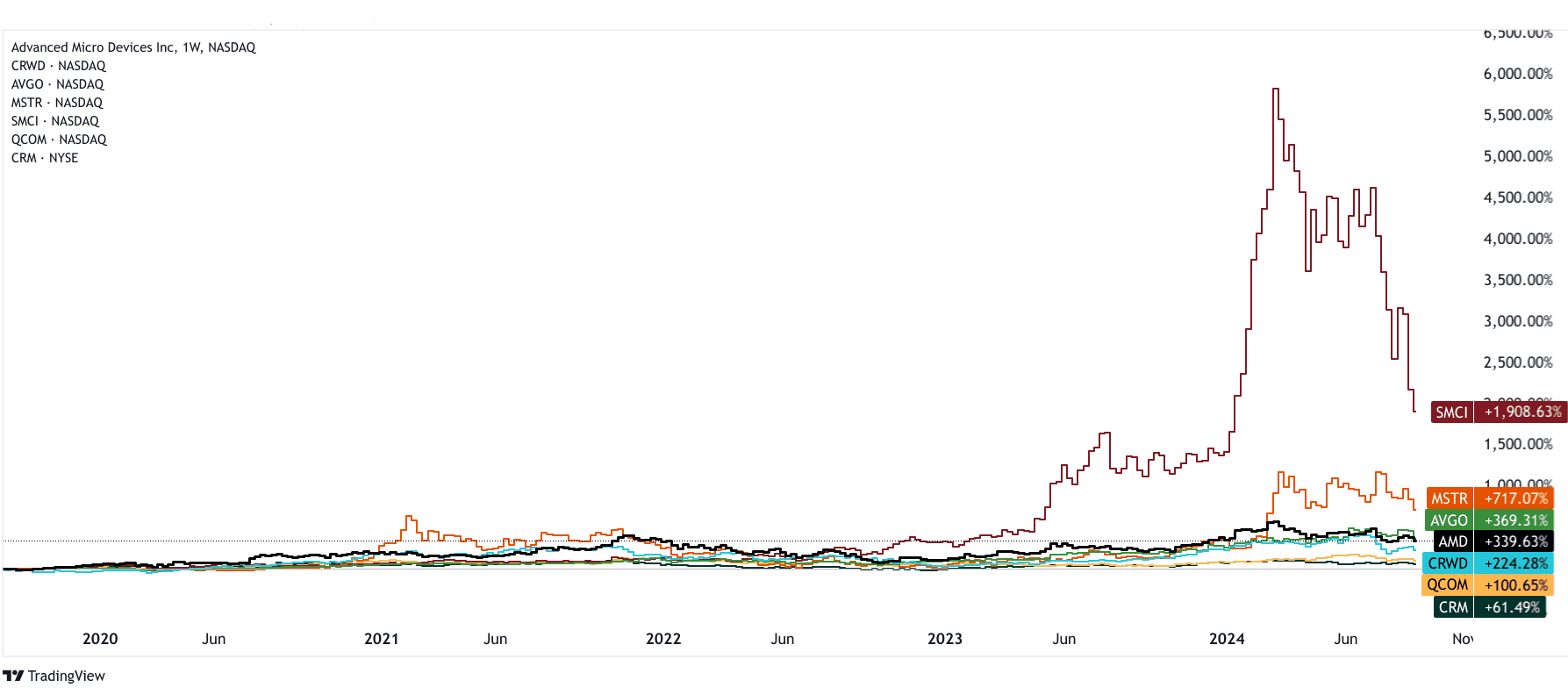 Source:tradingview.com
Source:tradingview.com
- Adobe (ADBE): Dominating the digital content creation space, Adobe’s creative software and its push into AI-enhanced products support growth.
- Applied Materials (AMAT): A semiconductor manufacturing equipment provider, AMAT benefits from the ongoing chip boom.
- Zoom Video (ZM): Specializing in video communications, Zoom saw rapid growth during the pandemic and continues to expand its enterprise offerings.
- Dell Technologies (DELL): A major player in PCs and enterprise hardware.
- Palantir (PLTR): Known for big data analytics, Palantir is gaining ground in government and commercial sectors.
- Accenture (ACN): A global consulting firm that specializes in technology and digital transformation projects.
- Oracle (ORCL): A leader in cloud computing and database management systems.
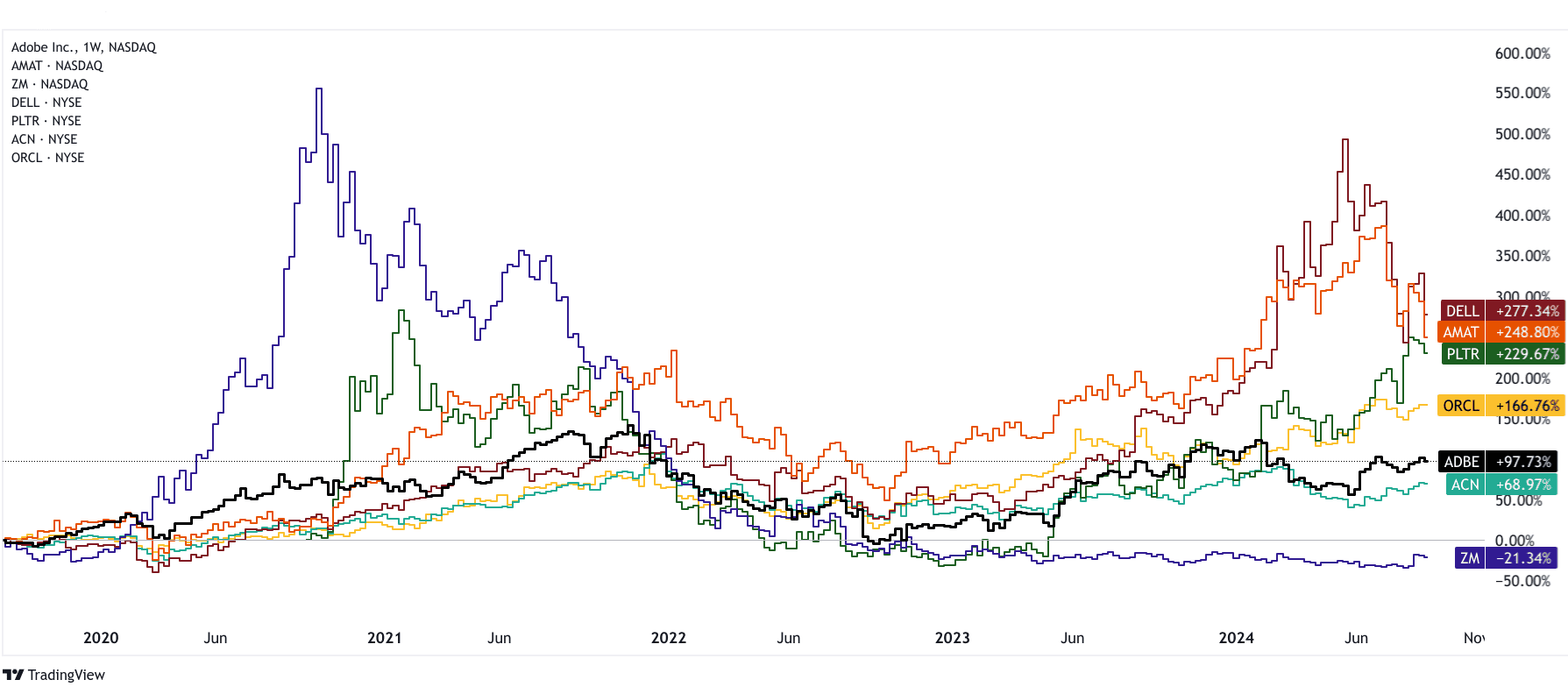 Source:tradingview.com
Source:tradingview.com
These companies provide diverse opportunities within the tech sector, with innovations in AI, cloud computing, and semiconductors driving future growth potential.
III. Factors to Consider When Investing in Tech Stocks
- Company Financial Performance: When evaluating tech stocks, investors should focus on key financial metrics like revenue growth, profit margins, and cash flow. Consistent earnings growth and robust balance sheets are signs of stability. Cash reserves and debt levels should also be assessed, as tech companies often reinvest heavily in innovation.
- Innovation: Innovation drives tech company success. Firms that lead in cutting-edge technologies such as artificial intelligence (AI), blockchain, or 5G are more likely to experience growth. For instance, Microsoft’s integration of AI tools like ChatGPT into its Office suite in mid-2023. Companies that fail to innovate may stagnate or decline, as the tech landscape is highly dynamic.
- Product Lifecycle: Understanding a company's product lifecycle is essential. Products in the early stages of adoption, such as electric vehicles (EVs) for Tesla or the Vision Pro for Apple, can lead to high growth. However, mature products may face declining sales or market saturation, requiring firms to develop new revenue streams.
- Market Volatility: Tech stocks are known for their volatility. Stocks like Tesla faced significant swings due to broader economic conditions, including interest rate changes and inflation. Investors should be prepared for higher short-term volatility in tech relative to other sectors.
- Competitive Risk: The tech industry is highly competitive. Market leaders like Amazon (e-commerce) or Nvidia (AI and GPUs) face constant competition from emerging players, which can erode market share and profitability. Competitive pressures can affect pricing power and long-term margins.
- Technological Risk: Rapid technological changes present risks. A breakthrough in quantum computing, for instance, could disrupt existing business models. Companies that fail to adapt to new technologies could face obsolescence.
- Global Exposure: Tech companies often operate globally, making them susceptible to international risks like currency fluctuations, geopolitical tensions, and varying regulatory environments. For example, Nvidia derives more than 31% of its revenue from China and Taiwan, exposing it to risks in this region.
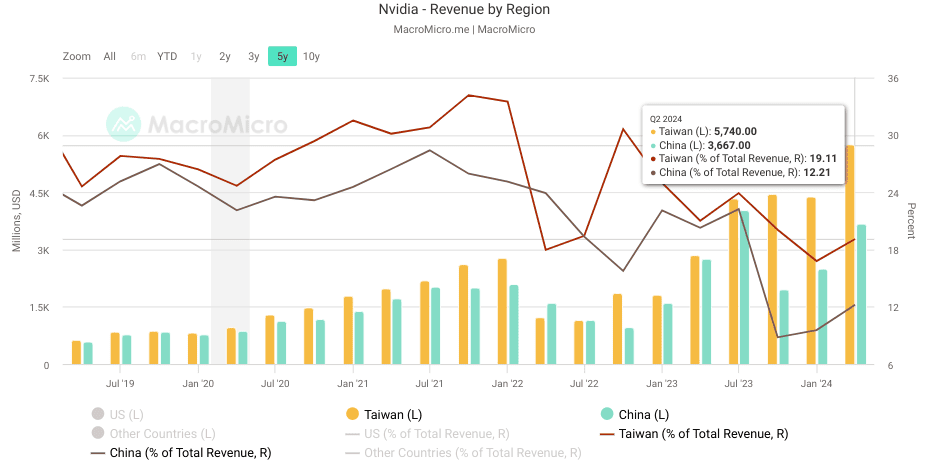
Source: en.macromicro.me
Tech Stocks Investment Strategies
- Diversification: Spread investments across multiple tech companies to reduce risk.
- Stock Purchase: Buy individual stocks of leading tech companies with strong fundamentals.
- ETFs and Mutual Funds: Invest in diversified funds like the Invesco QQQ Trust ETF, which tracks major tech stocks like the Magnificent Seven, to gain broad sector exposure with lower risk.
IV. Tech Industry Trends & Tech Stocks Outlook
The global tech industry remains a powerhouse, with an estimated market size of $5.3 trillion in 2023. This sector continues to grow rapidly, with projections indicating a compound annual growth rate (CAGR) of 5% through 2027, driven by ongoing digital transformation and technological advancements. Key regional markets include North America, which accounts for 35% of global tech spending, and Asia-Pacific, a growing region fueled by innovation in countries like China and India.
Future Trends
- AI & Machine Learning: Artificial Intelligence (AI) is a major driver for the tech sector. The global AI market was valued at $638 billion in 2024 and is expected to grow to $3.7 trillion by 2034. Tech companies like Nvidia, Microsoft, and Alphabet are investing heavily in AI. AI is expected to transform industries, from healthcare to finance, making it a key growth catalyst for tech companies.
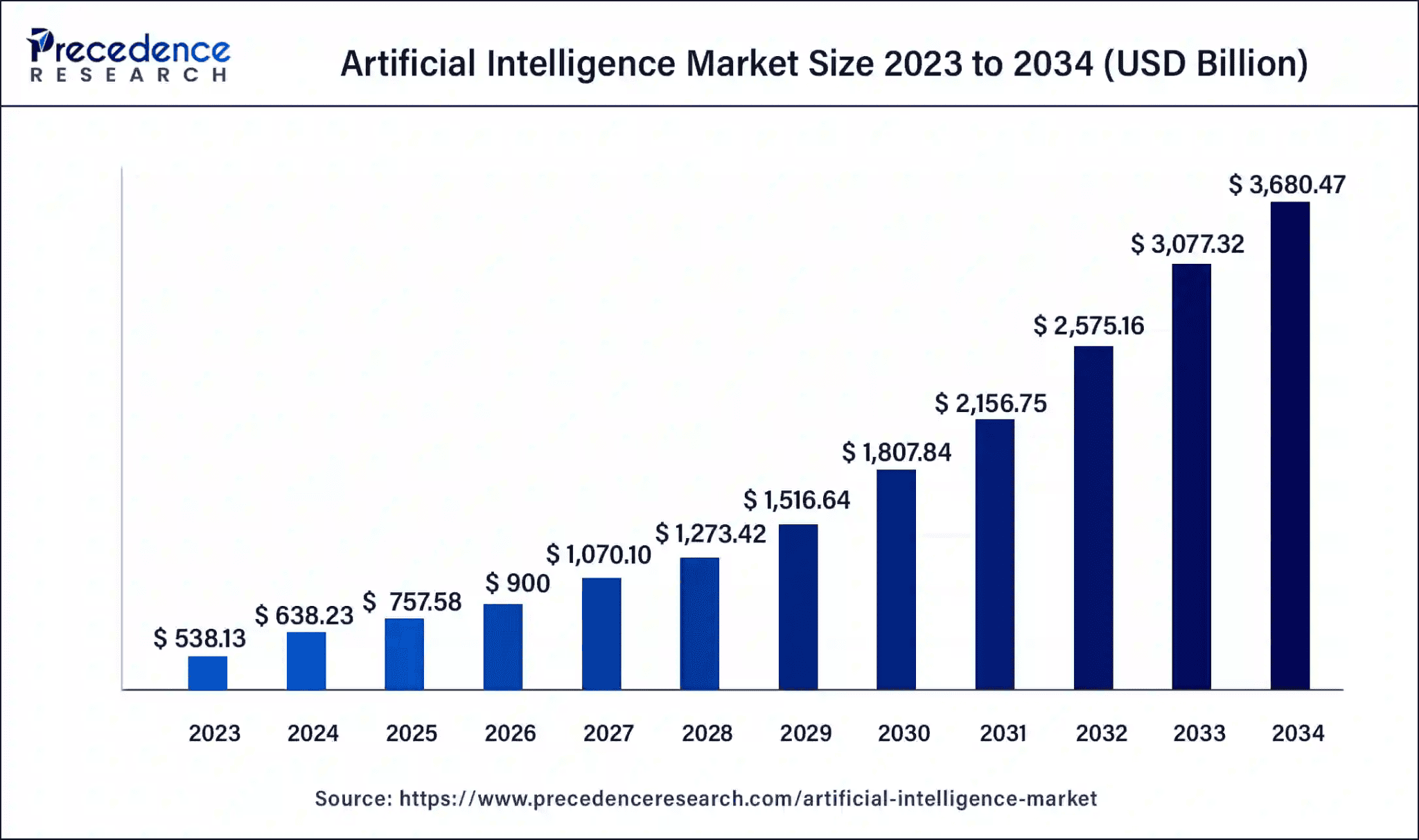
Source: precedenceresearch.com
- Cloud Computing & SaaS: Cloud computing is another critical trend. The cloud market was valued at $680 billion in 2024 and is forecasted to reach $1.44 trillion by 2029. Leading players like Amazon (AWS), Microsoft (Azure), and Google Cloud dominate this space. The shift toward Software as a Service (SaaS) models continues to benefit companies like Salesforce.
- 5G Technology: 5G is expanding rapidly, with projections that global 5G subscriptions will reach 4.6 billion by 2028. Qualcomm (QCOM) is a key player, providing 5G chipsets and solutions, benefiting from the rollout of 5G networks. The adoption of 5G is expected to accelerate innovations in connected devices, autonomous vehicles, and the Internet of Things (IoT).
- Cybersecurity: With the rise in cyber threats, cybersecurity is an increasingly important sector. The global cybersecurity market is expected to grow from $185 billion in 2024 to $272 billion by 2029. Companies like CrowdStrike, which specializes in endpoint protection, are at the forefront of this trend.
- Metaverse & VR/AR: The metaverse is an emerging frontier, with Meta (Facebook) leading the charge through its Oculus division. The global metaverse market could grow from $74 billion in 2024 to $508 billion by 2030. Apple’s Vision Pro headset also highlights the growing interest in augmented reality (AR) and virtual reality (VR). While still in its early stages, the metaverse represents long-term growth potential for these companies.
- Quantum Computing: Quantum computing is an evolving field that could revolutionize sectors like cryptography and material science. Companies like IBM and Google are investing heavily in quantum research. Although commercial viability is still years away, it remains a key area of interest for long-term tech growth.
Long-term Outlook for Tech Stocks
- Continued Dominance of the Magnificent Seven: The Magnificent Seven (Apple, Microsoft, Nvidia, Alphabet, Amazon, Meta, and Tesla) are expected to maintain their leadership positions. Their combined market cap in May 2024 represented over 41% of the Nasdaq-100. These companies benefit from their dominance in core technologies like AI, cloud computing, and digital advertising. For instance, Tesla, with its focus on electric vehicles (EVs) and autonomous driving, is expected to grow as EV adoption rises globally, reaching 350 million vehicles by 2030.
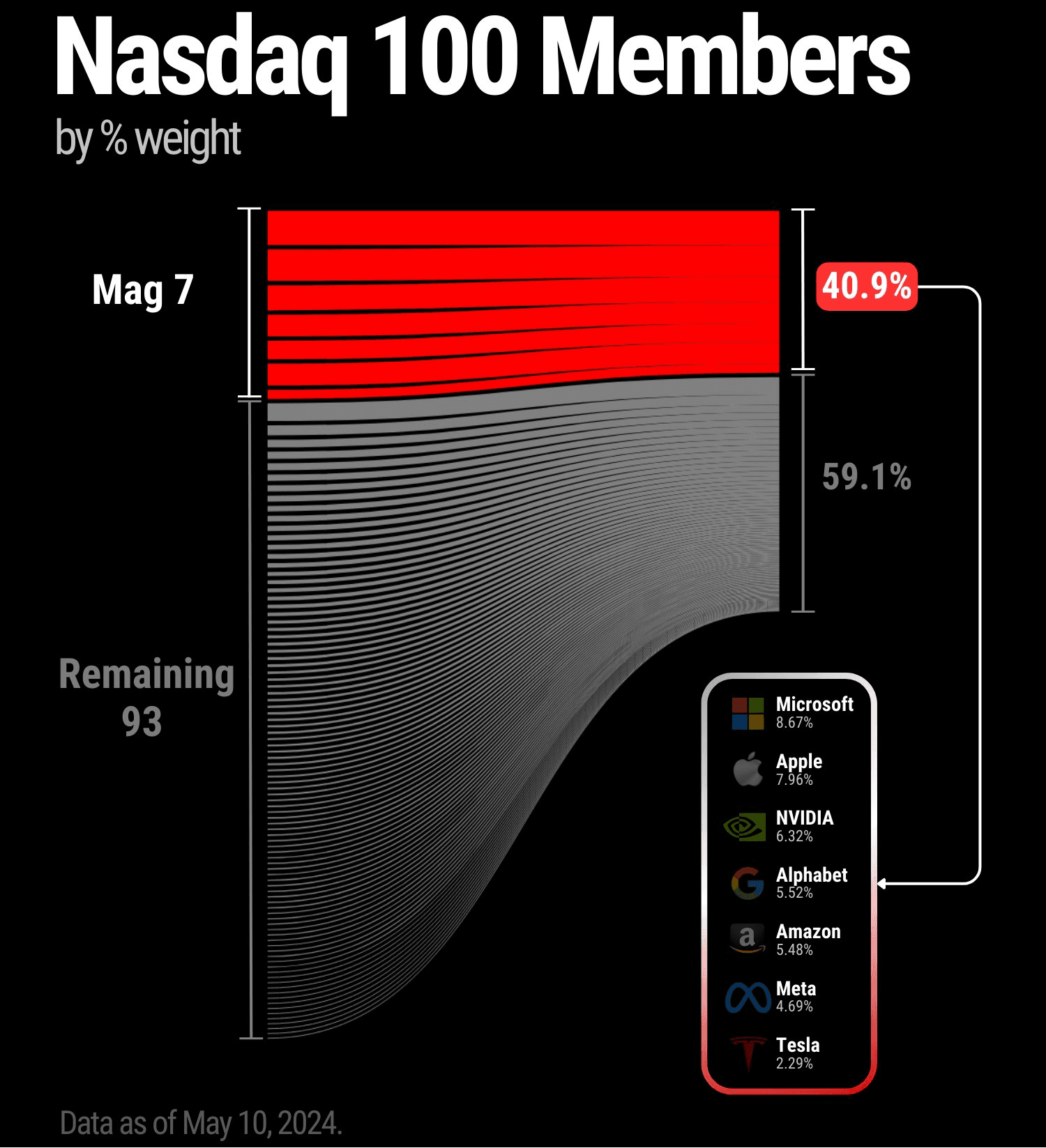
Source: x.com/OKavrak
- Growth in Mid-Sized and Emerging Tech Stocks: Mid-sized and emerging tech companies are also poised for growth, especially in sectors like AI, machine learning, robotics, semiconductors, cybersecurity, EVs, and cloud services.

